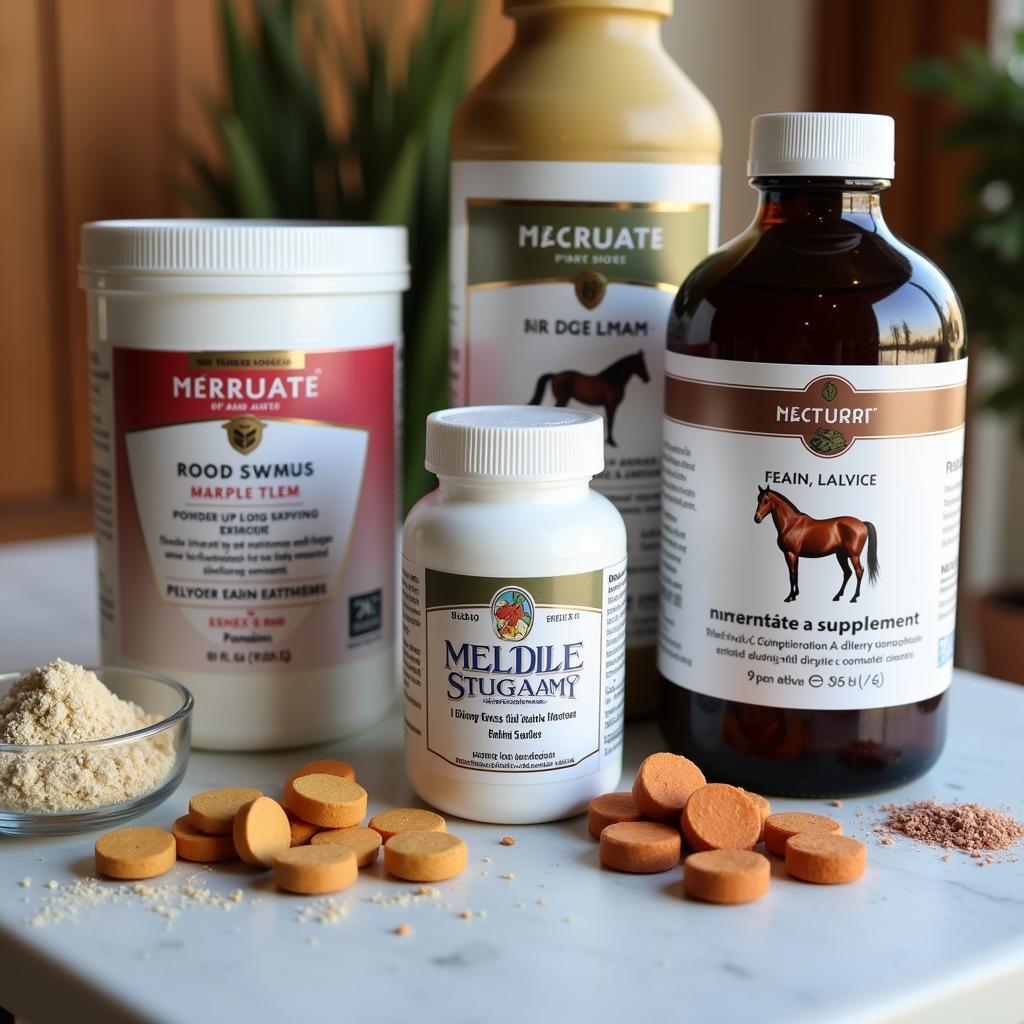Horse Allergy Supplements are becoming increasingly popular as horse owners seek ways to manage their horses’ allergies and improve their overall well-being. Understanding the different types of supplements, their benefits, and how to choose the right one for your horse is crucial for effective allergy management.
Understanding Horse Allergies
Just like humans, horses can suffer from a variety of allergies. These allergies can manifest in various ways, from skin irritations like hives and itching to respiratory problems like coughing and wheezing. Common allergens for horses include dust mites, pollen, mold spores, and insect bites. Identifying the specific allergen triggering your horse’s reaction is essential for targeted treatment.  Horse scratching its mane due to allergies
Horse scratching its mane due to allergies
Some horses may also experience allergies to certain feeds or bedding materials. Symptoms can range from mild discomfort to severe reactions that require immediate veterinary attention. Recognizing the signs of an allergic reaction in your horse is crucial for timely intervention and effective management.
Choosing the Right Horse Allergy Supplement
With the plethora of horse allergy supplements available on the market, selecting the right one can be daunting. Factors to consider include the type of allergy, the severity of the symptoms, and the horse’s overall health. Some common ingredients found in horse allergy supplements include omega-3 fatty acids, antioxidants, and herbs like spirulina and nettle.
Always consult with your veterinarian before starting your horse on any new supplement, especially if the horse is already on other medications or has pre-existing health conditions. They can help you determine the appropriate supplement and dosage for your horse’s specific needs. For persistent itching, you might want to check out our article on horse has itchy tail.
Different Types of Horse Allergy Supplements
There are several types of horse allergy supplements available, each targeting specific allergy symptoms. Some supplements focus on supporting skin health, while others aim to boost the immune system or reduce inflammation.  Various horse allergy supplements in different forms like powders, liquids, and chewable tablets.
Various horse allergy supplements in different forms like powders, liquids, and chewable tablets.
- Omega-3 Fatty Acids: Known for their anti-inflammatory properties, omega-3s can help reduce skin inflammation and itching.
- Antioxidants: These help protect cells from damage caused by free radicals, which can contribute to allergic reactions.
- Herbal Supplements: Certain herbs, such as spirulina and nettle, have natural antihistamine properties.
Managing Your Horse’s Allergies Holistically
While horse allergy supplements can be beneficial, they are most effective when used as part of a comprehensive allergy management plan. This includes minimizing exposure to known allergens, maintaining a clean and dust-free environment, and providing a balanced diet.
Regular grooming can also help remove allergens from your horse’s coat and skin. If your horse suffers from insect bite allergies, consider using a fly repellent. You can find more information on effective fly control in our article on fly ointment for horses.
When to See a Vet
If your horse’s allergy symptoms persist or worsen despite using supplements and other management strategies, it’s essential to consult with your veterinarian. They can perform allergy testing to identify the specific allergen causing the reaction and recommend appropriate treatment options. This might involve prescription medications or other therapies. Just like some medications are given “as needed” for people, there are similar considerations for horses. Learn more about this in our article on prn horse.
“It’s important to remember that no single supplement works for every horse,” says Dr. Emily Carter, DVM, a renowned equine veterinarian. “A personalized approach based on the individual horse’s needs is crucial for effective allergy management.”
Conclusion
Horse allergy supplements can play a significant role in managing allergies and improving your horse’s quality of life. By understanding the different types of supplements available and working closely with your veterinarian, you can develop a tailored plan to help your horse find relief from allergy symptoms and thrive. Remember, early intervention and consistent management are key to effectively controlling horse allergies. Interested in other natural supplements for horses? Check out our article on horse cinnamon. We also have information on oil horses which may be relevant for skin health.
FAQ
- What are the common signs of horse allergies?
- How do I choose the right horse allergy supplement?
- Can I give my horse multiple allergy supplements at the same time?
- Are there any side effects of horse allergy supplements?
- How long does it take for horse allergy supplements to work?
- Can allergies be cured in horses?
- What are some natural remedies for horse allergies?
For support, contact us 24/7 at Phone: 0772127271, Email: [email protected] or visit us at QGM2+WX2, Vị Trung, Vị Thuỷ, Hậu Giang, Việt Nam.